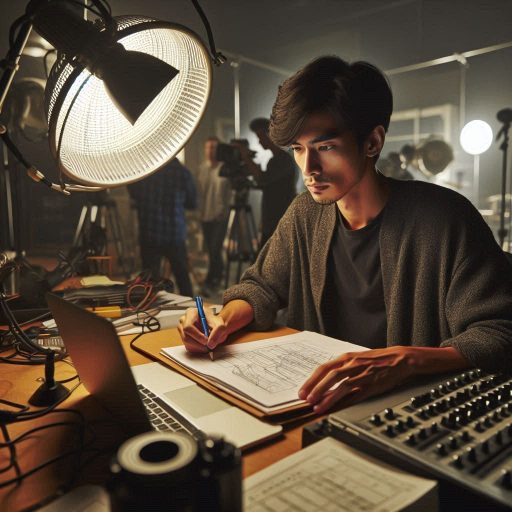Introduction
Interviews play a crucial role in the career journey of aspiring lighting designers.
They serve as the gateway to exciting opportunities.
Lighting design is a competitive field, and interviews can shape a designer’s future.
Understanding how to navigate this process is essential.
Aspiring lighting designers must present their skills effectively.
The interview is their chance to showcase creativity and technical expertise.
Employers seek candidates who not only possess artistic vision but also understand technical details.
A strong interview performance can set candidates apart from others.
However, many challenges arise during interviews in this field.
Candidates often face intense competition.
Many aspiring designers vie for the same positions.
This competition can create significant pressure.
Applicants must not only demonstrate their knowledge but also their passion for lighting design.
Additionally, interviewers may ask complex technical questions.
Candidates need to think quickly and articulate their ideas clearly.
This requirement can be intimidating for many applicants.
The ability to explain lighting techniques or design concepts is vital.
Designers must also be ready to discuss their previous work and experience.
Furthermore, candidates often encounter questions about teamwork and collaboration.
Lighting designers frequently work with directors, producers, and other creatives.
Interviewers want to see how well candidates can communicate and collaborate.
Demonstrating strong interpersonal skills can significantly enhance an applicant‘s prospects.
Moreover, the pressure of presenting a portfolio can be daunting.
A well-organized portfolio showcases a designer’s best work.
However, discussing each piece effectively can be challenging.
Candidates should prepare to explain their design choices and the concepts behind their work.
Research the Company/Client
Understanding the background and projects of the company or client you are interviewing with is crucial for aspiring lighting designers.
This information will not only help you tailor your responses during the interview but also show your genuine interest in the position.
Importance of Understanding the Company/Client’s Background and Projects
- Shows your enthusiasm and commitment
- Helps you align your skills with their needs
- Allows you to ask informed questions
Researching the company/client demonstrates that you are proactive and have taken the time to prepare for the interview.
Tips on How to Research the Company/Client Effectively
- Visit the company’s website
- Read about their past projects
- Follow them on social media
- Look for recent news articles or press releases
- Reach out to current or former employees for insights
By thoroughly researching the company or client, you will be better equipped to showcase your skills and experiences during the interview.
Increasing your chances of landing the job as an aspiring lighting designer.
Read: Networking Events for Costume Designers
Understanding the Job Role
Specific responsibilities and requirements for a lighting designer
A lighting designer is responsible for creating and implementing lighting designs for various projects.
They work closely with clients to understand their needs and preferences for lighting.
A lighting designer must have a strong understanding of lighting techniques, equipment, and technology.
They are responsible for ensuring that the lighting design enhances the overall aesthetic and functionality of a space.
It is important for a lighting designer to stay updated on current trends and advancements in lighting technology.
Tailoring Your Responses During the Interview
Research the specific job requirements and responsibilities of the position you are applying for.
Be prepared to discuss your past experiences and how they relate to the job role of a lighting designer.
Showcase your knowledge of different lighting techniques and equipment during the interview.
Highlight any previous projects or collaborations that demonstrate your skills as a lighting designer.
Be prepared to discuss how you would approach different lighting design challenges that may arise.
Showcase your Portfolio
- Sharing previous projects and designs is crucial for aspiring lighting designers.
- Your portfolio is a reflection of your skill, creativity, and experience in the field.
- It allows potential employers or clients to understand your style and capabilities.
- Make sure your portfolio includes a variety of projects to showcase your versatility.
Importance of sharing previous projects and designs
- Demonstrates your expertise and experience in the field.
- Showcases your creativity and unique design aesthetic.
- Provides concrete examples of your work for potential employers to review.
- Allows you to highlight successful projects and client feedback.
Tips on organizing and presenting your portfolio effectively
Start by selecting your best work to include in your portfolio.
Organize your projects in a logical order, such as by project type or client.
Provide context for each project, including your role, objectives, and challenges faced.
Include high-quality images of your work to visually showcase your designs.
Consider creating a digital portfolio to easily share your work with potential employers.
Update your portfolio regularly to include your most recent projects and skills.
Transform Your Career Today
Unlock a personalized career strategy that drives real results. Get tailored advice and a roadmap designed just for you.
Start NowBe selective in choosing which projects to include to ensure quality over quantity.
Seek feedback from peers or mentors to improve your portfolio presentation.
Tailor your portfolio to the specific job or client you are applying to, highlighting relevant projects.
Practice presenting your portfolio, be prepared to discuss your process and design choices.
Remember, your portfolio is your visual resume as a lighting designer, so make sure to put your best foot forward and impress potential clients or employers with your work.
Read: Building a Portfolio for Costume Design
Highlight your Skills and Experience
As an aspiring lighting designer, it is crucial to highlight your skills and experience in the field to stand out during interviews.
Relevant skills and experience in lighting design
Highlight your proficiency in using lighting design software, understanding of lighting principles, and your ability to create visually appealing lighting schemes.
Make sure to mention any relevant coursework or projects that demonstrate your expertise in this area.
Examples of how your skills can contribute to the role
Illustrate how your skills and experience align with the requirements of the job.
For instance, talk about a project where you successfully integrated lighting design to enhance the ambiance of a space or discuss how you collaborated with a team of architects and interior designers to achieve a cohesive design vision.
Seek Feedback and Continuous Improvement
Feedback is essential for growth and development in any profession, including lighting design. Here are some tips on how to seek feedback and continually improve your skills:
Reach out to experienced lighting designers or colleagues for feedback on your work.
They can provide valuable insights and suggestions for improvement based on their own experiences in the industry.
Take advantage of training opportunities
Attend workshops, webinars, or conferences that focus on lighting design to stay current on industry trends and advancements.
Continuous learning will help you refine your skills and expand your knowledge base.
Stay Updated on Industry Trends
To excel in the field of lighting design, it is essential to stay informed about the latest industry trends and technological advancements.
Follow industry publications and blogs
Subscribe to magazines, websites, and blogs that cover topics related to lighting design.
This will help you stay informed about emerging trends, innovative techniques, and notable projects in the field.
Network with professionals in the industry
Attend networking events, seminars, or trade shows to connect with other professionals in the lighting design industry.
Building relationships with industry experts can provide you with valuable insights and opportunities for collaboration.
By following these tips and continuously honing your skills, you can position yourself as a strong candidate for lighting design roles and excel in your career.
Remember to showcase your passion for the field and demonstrate your commitment to professional growth during interviews to make a lasting impression on potential employers.
Read: Visual Merchandiser: Job Market and Opportunities

Practice Common Interview Questions
One of the key elements to a successful job interview is being well-prepared for the questions that may be asked.
As an aspiring lighting designer, it’s essential to practice common interview questions related to your field in order to impress potential employers and showcase your skills effectively.
List of Common Interview Questions for Lighting Designers
- Can you walk us through your experience with lighting design projects?
- How do you stay updated on the latest lighting trends and technologies?
- What tools and software do you use for lighting design?
- How do you approach collaborating with other team members on a project?
- Can you provide an example of a challenging lighting design project you worked on, and how you overcame obstacles?
- How do you handle tight deadlines and pressure in the fast-paced environment of lighting design?
Tips on How to Prepare and Practice Your Responses to These Questions
- Research the company and familiarize yourself with their past lighting design projects.
- Practice your answers to common interview questions with a friend or in front of a mirror.
- Prepare examples from your past experiences that showcase your skills and problem-solving abilities.
- Be ready to discuss your design process, inspirations, and how you manage different types of projects.
- Show enthusiasm for the field of lighting design and your passion for creating innovative and impactful designs.
- Ask questions about the company and the projects they are currently working on to demonstrate your interest in their work.
By preparing thoroughly and practicing your responses to common interview questions, you’ll be better equipped to showcase your skills.
Experience, and enthusiasm for lighting design during job interviews.
Remember to stay confident, professional, and articulate in your responses to leave a lasting impression on potential employers.
Read: Visual Merchandising: Best Practices for Beginners
Demonstrate your Passion for Lighting Design
When interviewing for a role as a lighting designer, it is crucial to demonstrate your passion and enthusiasm for the field.
Here are some ways to showcase your dedication during the interview:
Transform Your Career Today
Unlock a personalized career strategy that drives real results. Get tailored advice and a roadmap designed just for you.
Start Now- Speak about what drew you to lighting design in the first place.
- Discuss any training or education you have pursued in the field.
- Share examples of projects or work experiences that have ignited your passion.
- Express your excitement for the opportunity to work in the industry.
- Highlight any unique skills or talents that set you apart as a lighting designer.
Ways to showcase your enthusiasm and passion for lighting design during the interview
One of the most effective ways to demonstrate your passion for lighting design during an interview is to be prepared to talk about what initially drew you to the field.
Whether it was a specific project, a personal interest, or a mentor who inspired you, sharing this story can help showcase your genuine enthusiasm.
Additionally, discussing any training or education you have pursued in lighting design can indicate your commitment to the field and willingness to grow as a professional.
Another way to showcase your passion is to share examples of projects or work experiences that have ignited your interest.
This could include a specific design challenge you overcame, a project that pushed you out of your comfort zone, or a collaboration that taught you valuable lessons.
By discussing these experiences in detail, you can demonstrate your hands-on experience and dedication to the craft.
Expressing your excitement for the opportunity to work in the lighting design industry is also key.
Employers want to know that you are passionate about the work you do and committed to making a positive impact.
By conveying your enthusiasm for the role and the industry as a whole, you can show that you are eager to contribute and make a difference.
Finally, it is important to highlight any unique skills or talents that set you apart as a lighting designer.
Whether you have a strong eye for detail, a knack for problem-solving, or a creative approach to design, showcasing these qualities can make you a more compelling candidate.
By emphasizing what makes you unique, you can demonstrate your passion and dedication to the field of lighting design.
Importance of sharing personal experiences and projects related to lighting design
Sharing personal experiences and projects related to lighting design during an interview is important for several reasons.
Firstly, it allows you to showcase your skills and experience in a tangible way, providing concrete examples of your work and accomplishments.
This can help interviewers better understand your qualifications and capabilities as a lighting designer.
Additionally, sharing personal experiences and projects can demonstrate your passion and enthusiasm for the field.
By discussing projects that have inspired you or challenges you have overcome, you can showcase your dedication to the craft and your willingness to go above and beyond in your work.
This can help differentiate you from other candidates and make a strong impression on potential employers.
Furthermore, sharing personal experiences and projects related to lighting design can help you connect with interviewers on a more personal level.
By sharing stories and insights from your own experiences, you can build rapport and showcase your personality and interests.
This can make you a more memorable candidate and help you stand out in a competitive job market.
See Related Content: Creative Director Career Path: From Intern to Pro
You Might Also Like: How to Start a Career in Jewelry Design
Conclusion
As we conclude our discussion on interview tips for aspiring lighting designers, let’s recap the essential points.
First, preparation is crucial.
Research the company and its projects.
Familiarize yourself with their style and vision.
Tailor your portfolio to showcase relevant work.
Highlight your best projects that align with their aesthetic.
Next, practice common interview questions.
Prepare to discuss your design process and inspirations.
Be ready to share experiences that demonstrate your problem-solving skills.
Use the STAR method (Situation, Task, Action, Result) to frame your responses effectively.
This method keeps your answers concise and relevant.
During the interview, showcase your creativity.
Bring along sketches or mood boards to illustrate your ideas.
Visual aids can make your concepts more tangible and memorable.
Use them to engage your interviewers and demonstrate your passion.
Communication is key.
Speak clearly and confidently about your experiences.
Use specific examples to illustrate your points.
Avoid jargon unless necessary, as it can confuse your interviewers.
Remember, they want to understand your vision, so make it accessible.
Also, demonstrate your teamwork skills.
Lighting design often involves collaboration.
Share examples of how you‘ve successfully worked with directors, set designers, and other team members.
Emphasize your ability to listen and adapt to feedback.
Highlighting your collaboration skills can set you apart from other candidates.




